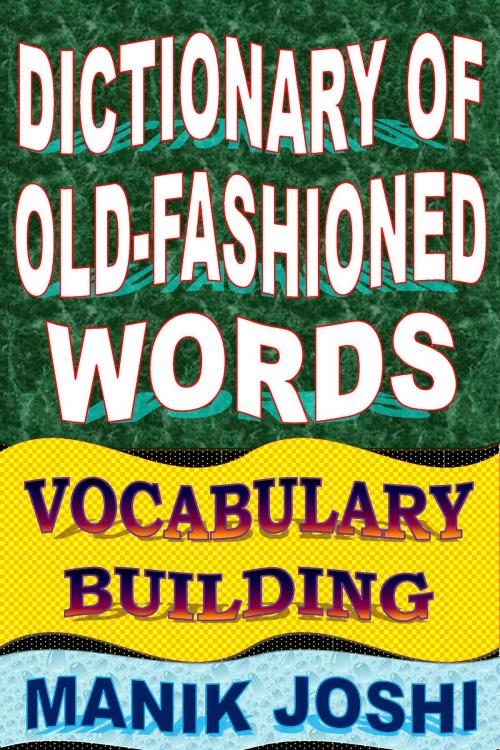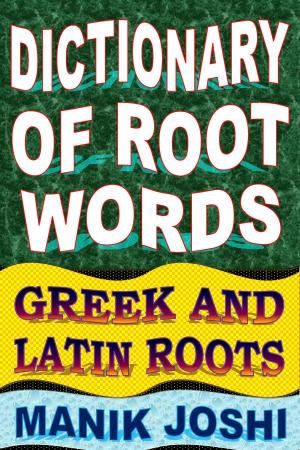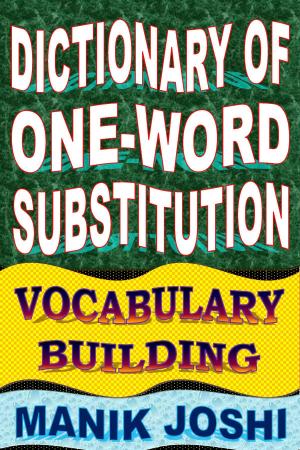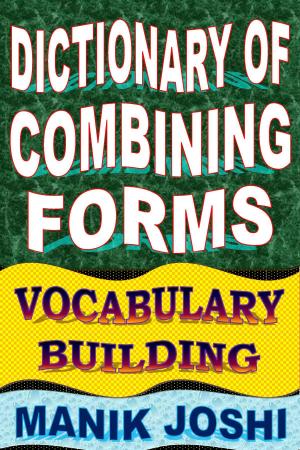Dictionary of Old-fashioned Words: Vocabulary Building
Nonfiction, Reference & Language, Education & Teaching, Non-Formal Education, Study Aids, ESL, Foreign Languages| Author: | Manik Joshi | ISBN: | 9781311141903 |
| Publisher: | Manik Joshi | Publication: | July 9, 2014 |
| Imprint: | Smashwords Edition | Language: | English |
| Author: | Manik Joshi |
| ISBN: | 9781311141903 |
| Publisher: | Manik Joshi |
| Publication: | July 9, 2014 |
| Imprint: | Smashwords Edition |
| Language: | English |
What are “Old-fashioned Words”?
Definition of ‘Old-fashioned words’:
“Words and expressions that were common in the past but are passing out of ordinary use.”
‘Old-fashioned words’ are also known as ‘archaic words’. Many people use the term ‘old use’ for the words and expressions that were common in the past but have passed out of ordinary use.
These words are mainly used in historical novels. They are also used to amuse people.
Examples:
Old-fashioned word:
dandified [adjective]
(of a man) too careful about his look or clothes
Old-fashioned word:
vamoose [verb]
to leave fast
Old-fashioned idiom
blot your copybook -- to do something bad to spoil your good reputation among people
Old-fashioned phrasal verb
buck up! -- used to tell somebody to make haste
Detailed list of “old-fashioned words”, parts of speech they belong to, and their meanings are as follows:
Old-fashioned Words -- A
abed [adverb]
in bed
abide [verb]
to stay or live in a place
Use in a sentence: Everybody must abide by the law.
abroad [adverb]
outside; outdoors
accidence [noun]
the part of grammar that deals with the change in the form of a word
accursed [adjective]
having a bad magic spell on something
Use in a sentence: They lived in the forest as if accursed. || There is no escaping the sense of anxiety that we humans are accursed with.
adieu [exclamation]
goodbye
Use in a sentence: They bid adieu to him with mixed emotions.
addled [adjective]
confused / (of an egg) not fresh
Use in a sentence: He is not a silly and addled dude.
without further/more ado [idiom]
at once; immediately
Use in a sentence: Once it was sure that the area had been secured, the children were without more ado accompanied to the assembly hall.
adventurer / adventuress [noun]
a person who is very fond of going to unusual places or gaining new experiences
Use in a sentence: She is a hard-core adventuress, a travel journalist, who has traveled around the world.
aerodrome (airdrome) [noun]
a small airport
Use in a sentence: The extension of the runway was aimed at better services for private operators at the aerodrome.
affair [noun]
an strange or inexplicable thing
affright [verb]
to scare; to frighten
Use in a sentence: Let nothing affright you.
ague [noun]
malaria, dengue or other disease that causes fever and shivering
ail [verb]
to make somebody ill/sick
air hostess [noun]
a female flight attendant
alack [exclamation]
a word that is used to show you are sad or sorry
Use in a sentence: Alas and alack, only a few of those stories are all that funny.
alas [exclamation]
a word that is used to show you are sad or sorry
Use in a sentence: His experiments, alas, were flawed and had been mythologized.
be all up (with somebody) [idiom]
to be the end for somebody
almoner [noun]
a person employed by a hospital to handle financial and social problems of patients
Use in a sentence: They wanted a more active almoner, who could find innovative ways to help the poor.
alms [noun]
money, clothes, food, etc. given to beggars or poor people
Use in a sentence: They were injured in a stampede to receive alms being distributed by a charity.
in the altogether [idiom]
without wearing any clothes
Amerindian [noun]
Native American
Use in a sentence: The word 'guava' originates from the language of the Arawaks, an Amerindian people from the Caribbean.
ammo [noun]
ammunition
Use in a sentence: They have tested and run a lot of ammo through their rifles.
amour [noun]
a secret love affair
anon [adverb]
soon; early, immediately; in a moment
apoplexy [noun]
the sudden and complete loss of the ability to sense or move
apoplectic [adjective]
related to apoplexy
apparel [noun]
formal clothes
Use in a sentence: The US apparel industry is highly fragmented with many players.
applesauce [noun]
nonsense
Use in a sentence: All politics is applesauce!
What are “Old-fashioned Words”?
Definition of ‘Old-fashioned words’:
“Words and expressions that were common in the past but are passing out of ordinary use.”
‘Old-fashioned words’ are also known as ‘archaic words’. Many people use the term ‘old use’ for the words and expressions that were common in the past but have passed out of ordinary use.
These words are mainly used in historical novels. They are also used to amuse people.
Examples:
Old-fashioned word:
dandified [adjective]
(of a man) too careful about his look or clothes
Old-fashioned word:
vamoose [verb]
to leave fast
Old-fashioned idiom
blot your copybook -- to do something bad to spoil your good reputation among people
Old-fashioned phrasal verb
buck up! -- used to tell somebody to make haste
Detailed list of “old-fashioned words”, parts of speech they belong to, and their meanings are as follows:
Old-fashioned Words -- A
abed [adverb]
in bed
abide [verb]
to stay or live in a place
Use in a sentence: Everybody must abide by the law.
abroad [adverb]
outside; outdoors
accidence [noun]
the part of grammar that deals with the change in the form of a word
accursed [adjective]
having a bad magic spell on something
Use in a sentence: They lived in the forest as if accursed. || There is no escaping the sense of anxiety that we humans are accursed with.
adieu [exclamation]
goodbye
Use in a sentence: They bid adieu to him with mixed emotions.
addled [adjective]
confused / (of an egg) not fresh
Use in a sentence: He is not a silly and addled dude.
without further/more ado [idiom]
at once; immediately
Use in a sentence: Once it was sure that the area had been secured, the children were without more ado accompanied to the assembly hall.
adventurer / adventuress [noun]
a person who is very fond of going to unusual places or gaining new experiences
Use in a sentence: She is a hard-core adventuress, a travel journalist, who has traveled around the world.
aerodrome (airdrome) [noun]
a small airport
Use in a sentence: The extension of the runway was aimed at better services for private operators at the aerodrome.
affair [noun]
an strange or inexplicable thing
affright [verb]
to scare; to frighten
Use in a sentence: Let nothing affright you.
ague [noun]
malaria, dengue or other disease that causes fever and shivering
ail [verb]
to make somebody ill/sick
air hostess [noun]
a female flight attendant
alack [exclamation]
a word that is used to show you are sad or sorry
Use in a sentence: Alas and alack, only a few of those stories are all that funny.
alas [exclamation]
a word that is used to show you are sad or sorry
Use in a sentence: His experiments, alas, were flawed and had been mythologized.
be all up (with somebody) [idiom]
to be the end for somebody
almoner [noun]
a person employed by a hospital to handle financial and social problems of patients
Use in a sentence: They wanted a more active almoner, who could find innovative ways to help the poor.
alms [noun]
money, clothes, food, etc. given to beggars or poor people
Use in a sentence: They were injured in a stampede to receive alms being distributed by a charity.
in the altogether [idiom]
without wearing any clothes
Amerindian [noun]
Native American
Use in a sentence: The word 'guava' originates from the language of the Arawaks, an Amerindian people from the Caribbean.
ammo [noun]
ammunition
Use in a sentence: They have tested and run a lot of ammo through their rifles.
amour [noun]
a secret love affair
anon [adverb]
soon; early, immediately; in a moment
apoplexy [noun]
the sudden and complete loss of the ability to sense or move
apoplectic [adjective]
related to apoplexy
apparel [noun]
formal clothes
Use in a sentence: The US apparel industry is highly fragmented with many players.
applesauce [noun]
nonsense
Use in a sentence: All politics is applesauce!















